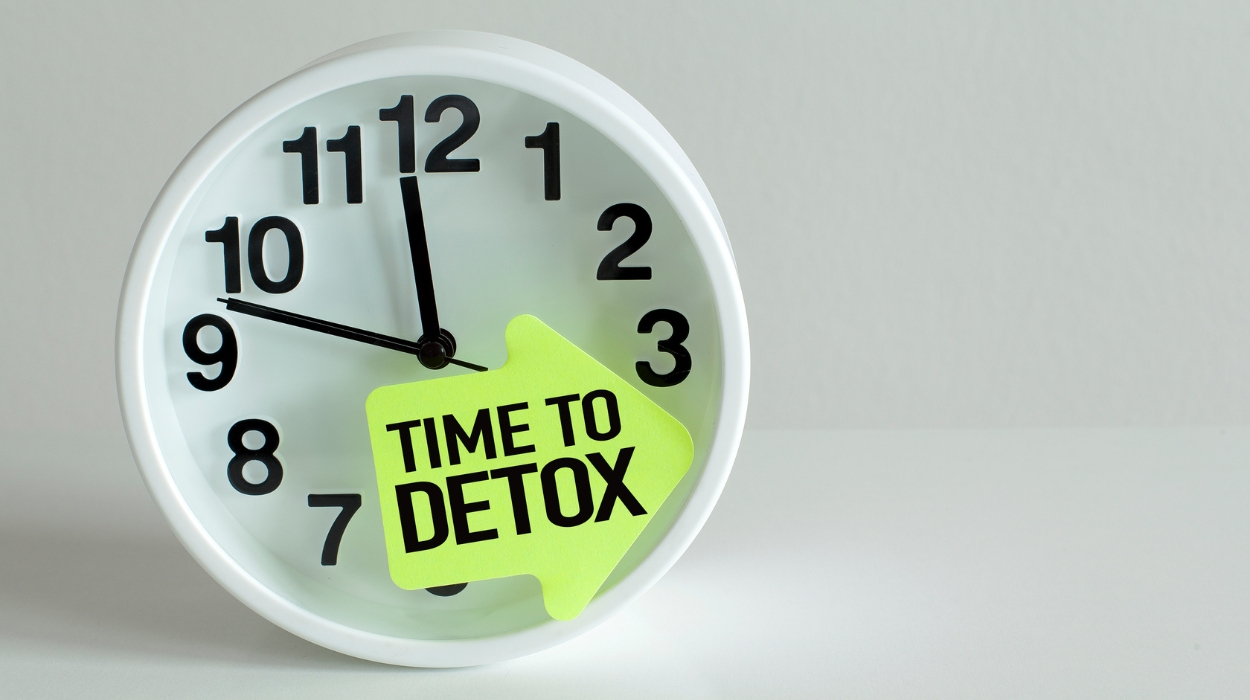Detoxification (or detox) is the process of removing harmful toxins from the body. It involves removing waste from the blood in the liver, where toxins are normally processed for elimination. These toxins can be accumulated through exposure to environmental pollutants, unhealthy foods, and stress. While there are many detox programs and products available on the market, there are also natural ways to help your body detoxify itself. Some of the most effective and natural ways to detox your body include dietary changes, exercise, and lifestyle modifications. Incorporating these methods into your normal routine can help your body naturally eliminate toxins and improve your overall health and well-being.
How To Detox Your Body Naturally
There are several natural ways to detox your body. Here are some of the most effective methods:
- Drink plenty of water: Staying hydrated is essential for the body to eliminate toxins through urine and sweat.
- Avoid consuming processed foods: Toxins are heavily present in processed foods. They are high in unhealthy fats, refined carbs and can also be found in artificial sweeteners.
- Try fasting: Fasting allows the body to rest from digestion and instead focuses on repairing the cells in the body.
- Get enough sleep: Sleep and the quality of it is essential for the body to repair and regenerate itself thus is another critical component of the detoxification process.
- Lessen environmental exposures: Exposure to environmental toxins and pollutants can have a damaging effect on the body.
- Reduce stress: Chronic stress can increase the production of toxins in the body and can be a triggering factor for many different types of pathological conditions.
By incorporating these natural methods into your daily routine, you can help your body eliminate toxins and improve your overall health and well-being.
What Does A Detox Do?
A detox is a process that aids in the body in eliminating harmful toxins that have accumulated in the body. Usually, these toxins can come from various sources such as pollution, unhealthy diet, and stress. The goal of a detox is to support the body’s natural detoxification processes by reducing the toxic burden on the organs which promotes the elimination of toxins thus strengthening the immune system.2
The benefits of a detox include improved digestion, increased energy levels, healthier skin and hair, better immune function, weight loss, stress relief, and improved mental alertness.3 A detox can also help to reduce inflammation in the body, which has been linked to various chronic diseases.
While there are many ways to detoxify the body, including juice cleanses, fasting, and dietary changes, it’s important to note that the body is designed to naturally eliminate toxins on its own. By adopting a healthy lifestyle and avoiding exposure to harmful substances, you can support your body’s natural detoxification processes and promote optimal health and well-being.
Safe Ways To Detox Your Body

Diet fads and other health hacks may help detox your body quickly but can also be extremely dangerous. Here are seven safe ways to detox your body safely.
Avoid Sugar & Processed Foods
In processed foods, toxins are abundant. They often possess high levels of unhealthy fats, refined carbs and can be found in artificial sweeteners and additives. These are all toxic to the body and can lead to chronic health conditions down the line, such as diabetes, heart disease and cancer. Instead opt in for a diet rich in fruits, vegetables, whole grains, and lean protein as these can provide the nutrients needed to support the body’s detoxification process. Increasing the intake of fiber, minerals and vitamins help support the body’s natural way of healing and detoxifying.
Incorporate Probiotics Into Your Detox Diet
Probiotics are live microorganisms that aid in improving gut health and digestion. Probiotics can help to restore balance to the gut microbiome, which can support the body’s natural detoxification processes. The gut microbiome plays an important role in the elimination of toxins from the body. Imbalances can lead to impaired detoxification processes and an increased risk of chronic health conditions.
To incorporate probiotics into your diet, consider consuming foods that are naturally high in probiotics, such as yogurt, kefir, kimchi, sauerkraut, and kombucha. Alternatively, you can take probiotic supplements under the guidance of a healthcare professional as there are many different ones on the market.
Drink A Lot Of Water
Water is a key component of the body’s way of eliminating and flushing out toxins through urine and sweat. Water also supports both the liver and kidneys which have an active role in detoxifying the body. Hydration helps at the cellular level in order to maintain a functioning body and it is needed for other important functions throughout the body as well. Drinking purified water helps to ensure you are avoiding additional toxins. However, be sure to not drink too much to the point of flushing pertinent electrolytes and minerals out of your system as this can lead to dehydration and other health problems.
Fasting
Fasting can be used as a method of detoxing, as it can help to reduce the toxic burden on the body. The process behind fasting is that the body shifts into a state where it starts to use stored fat for energy. This process can help to release toxins that are stored in fat cells and help with weight loss. There are many different types of fasting that can be performed, from intermittent fasting to juicing and water fasting. However, it’s important to approach fasting for detoxing with caution and under the guidance of a healthcare professional.
Get Enough Sleep
Quality sleep is important for the body to repair and regenerate, which can support the body’s natural detoxification processes. The body works to eliminate toxins and waste products that have accumulated throughout the day. Sleep deprivation can lead to a high level of oxidative stress and inflammation in the body, which can impair the body’s natural detoxification processes. Additionally, chronic sleep deprivation has been linked to an increased risk of chronic health conditions such as diabetes, heart disease, and obesity. Getting at least 7-8 hours of sleep nightly, establishing a consistent sleep routine, avoiding electronics before bedtime, and creating a comfortable sleep environment can help to promote restful sleep.
Limit Alcohol Intake
Alcohol is processed by the liver, and excessive alcohol consumption can lead to liver damage, impaired liver function, and an increased risk of liver disease. Not to mention chronic alcohol consumption can lead to structural damage and disrupts normal function in every organ in the body. The liver plays a crucial role in the body’s natural detoxification processes, as it works to filter and eliminate toxins from the bloodstream. When the liver is not functioning properly, it may not be able to effectively eliminate toxins from the body. To support the body’s natural detoxification processes, it’s recommended to limit alcohol consumption or avoid it altogether. It is recommended that if adults choose to drink alcohol do so in moderation, which is one drink per day for women and up to two drinks daily for men.
Reduce Stress
Reducing stress can be beneficial for the body’s natural detoxification processes. Chronic stress can lead to increased levels of cortisol, a hormone that can impair the body’s natural detoxification processes and lead to an increased risk of chronic health conditions. Additionally, stress can contribute to inflammation in the body, which can further impair the body’s natural detoxification processes and lead to both unhealthy habits and an increased risk of developing chronic conditions. To reduce stress and support the body’s natural detoxification processes, consider incorporating stress-reducing activities into your daily routine. Examples include meditation, yoga, deep breathing exercises, spending time in nature, prioritizing self-care, and engaging in creative hobbies.
Body Detox Benefits

Detoxifying the body can provide a plethora of health benefits, including:
- Improved digestion: A detox can help to improve digestion by reducing inflammation in the digestive tract and supporting the growth of healthy gut bacteria.
- Increased energy levels: By eliminating toxins, the body can function more efficiently, leading to increased energy levels and improved overall performance.
- Clearer skin and hair: Many toxins can accumulate in the skin, leading to dullness and blemishes. Detoxifying the body can help to improve skin health, leaving it looking clearer and more radiant. It can also help with hair by allowing it to grow and shine.
- Better immune function: A detox can help to strengthen the immune system by reducing the load of toxins that can weaken it.
- Weight loss: Detoxing can help to eliminate excess water weight and reduce inflammation in the body, leading to weight loss.
- Improved mental clarity: By eliminating toxins from the body, a detox can also help to improve mental clarity and focus.
- Reduced risk of chronic disease: Chronic exposure to toxins can increase the risk of chronic diseases such as cancer, heart disease, and diabetes. A detox can help to reduce the toxic burden on the body, reducing the risk of these diseases.
Myths About Body Detoxing
While detoxes can provide some benefits, it’s important to separate fact from fiction and understand that they are not a cure-all solution for health and wellness.
- Myth: Detoxes are a quick fix for weight loss. Reality: While detoxes can help with weight loss in the short term, they are not a sustainable long-term solution. Most of the weight loss during a detox is due to water weight and can be regained quickly once the detox is over.
- Myth: Detoxes are necessary to eliminate toxins from the body. Reality: The body is designed to naturally eliminate toxins through organs such as the liver and kidneys. While a detox can help support this process, it’s not necessary for the body to eliminate toxins.
- Myth: Detoxes are safe for everyone. Reality: Detoxes can be dangerous for people with certain health conditions, such as diabetes or kidney disease. It’s important to consult with a healthcare provider before beginning a detox program.
- Myth: Detoxes can cure chronic diseases. Reality: There is no scientific evidence that detoxes can cure chronic diseases such as cancer or diabetes. While detoxes can help reduce inflammation in the body, they are not a substitute for medical treatment.
- Myth: Detoxes are necessary to “reset” the body. Reality: The body does not need a detox to “reset.” Eating a healthy diet, staying hydrated, and getting enough sleep and exercise can help support the body’s natural detoxification processes.
Conclusion
Detoxing can provide several health benefits, such as reducing inflammation, improving digestion, and boosting energy levels. However, it’s important to understand that there are myths and misconceptions surrounding detoxing, and it’s not a cure-all solution for health and wellness. It’s also important to approach detoxing safely and consult with a healthcare provider before beginning a detox program. Additionally, incorporating healthy lifestyle habits such as drinking plenty of water, eating a healthy diet, exercising regularly, practicing stress reduction techniques, and getting enough sleep can support the body’s natural detoxification processes. In conclusion, while detoxing can be beneficial, it’s important to approach it with caution and in conjunction with a healthy lifestyle.
Frequently Asked Questions
Detoxing is the process of eliminating harmful toxins from the body through various methods such as dietary changes, fasting, and exercise.
Detoxing can help to reduce the toxic burden on the body, leading to overall improved health and wellbeing, improved sleep and decreased risk of developing chronic health conditions.
The length of a detox can vary depending on the method used. Some detoxes can last a few days, while others may last several weeks or longer.
Side effects of detoxing can include headaches, fatigue, and digestive issues. These symptoms usually resolve within a few days, especially if fasting or participating in a specific detox diet.
Detoxes are not recommended for everyone, particularly those with certain health conditions such as diabetes or kidney disease. It’s important to consult with a healthcare provider before beginning a detox program.
Some popular detox methods include juice cleanses, fasting, and dietary changes such as eliminating processed foods and alcohol.
Detoxes can be risky for certain individuals, particularly those with preexisting health conditions. It’s important to consult with a healthcare provider before beginning a detox program.
Yes, there are several natural ways to support the body’s natural detoxification processes, including drinking plenty of water, eating a healthy diet, exercising regularly, and getting enough sleep.

